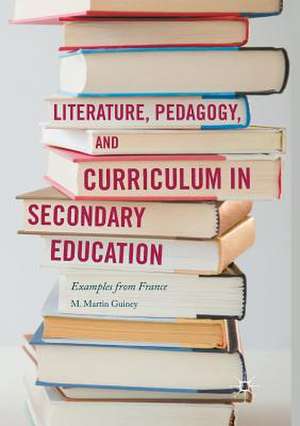Literature, Pedagogy, and Curriculum in Secondary Education: Examples from France
Autor M. Martin Guineyen Limba Engleză Paperback – aug 2018
Preț: 215.11 lei
Nou
Puncte Express: 323
Preț estimativ în valută:
41.16€ • 42.46$ • 34.35£
41.16€ • 42.46$ • 34.35£
Carte tipărită la comandă
Livrare economică 27 martie-10 aprilie
Preluare comenzi: 021 569.72.76
Specificații
ISBN-13: 9783319848303
ISBN-10: 3319848305
Pagini: 305
Ilustrații: X, 305 p.
Dimensiuni: 148 x 210 mm
Greutate: 0.38 kg
Ediția:Softcover reprint of the original 1st ed. 2017
Editura: Springer International Publishing
Colecția Palgrave Macmillan
Locul publicării:Cham, Switzerland
ISBN-10: 3319848305
Pagini: 305
Ilustrații: X, 305 p.
Dimensiuni: 148 x 210 mm
Greutate: 0.38 kg
Ediția:Softcover reprint of the original 1st ed. 2017
Editura: Springer International Publishing
Colecția Palgrave Macmillan
Locul publicării:Cham, Switzerland
Cuprins
Introduction.- Chapter 1. Aristocrats or Anarchists: Who Has Power over Lite.- Chapter 2. The Baccalauréat Exam and the French Canonical Literary Exercise.- Chapter 3. Inventing and Defending the General Education of Literature.- Chapter 4. Literature in French Schools after 1968.- Chapter 5. How (Not) to Teach: “Parroting” vs “Proximity” in Cinematic Representations of Literary Pedagogy.- Chapter 6. Harnessing the Neoliberal Beast.
Notă biografică
M. Martin Guiney is Professor of French in the Department of Modern Languages and Literatures at Kenyon College, USA. He has published on literary pedagogy in France and the United States, as well as on twentieth-century literature and film.
Textul de pe ultima copertă
This book argues for the importance of literature studies using the historical debate between the disinterested disciplines (“art for art’s sake”) and utilitarian or productive disciplines. Foregoing the traditional argument that literature is a unique spiritual resource, as well as the utilitarian thought that literary pedagogy promotes skills that are relevant to a post-industrial economy, Guiney suggests that literary pedagogy must enable mutual access between the classroom and the outside world. It must recognize the need for every human being to become a conscious producer of culture rather than a consumer, through an active process of literary reading and writing. Using the history of French curricular reforms as a case study for his analysis, Guiney provides a contextualized redefinition of literature’s social value.
Caracteristici
Explores the importance of literature not as a spiritual or utilitarian discipline alone, but rather as a useful spiritual discipline Seeks to examine the uncertain future of the “general education” status of literary studies by learning from its past Accelerates progress in debate over the value of literary study by explaining and evaluating arguments from Western educators
